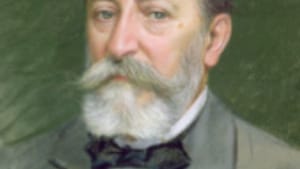Stay in the Loop
BSR publishes on a weekly schedule, with an email newsletter every Wednesday and Thursday morning. There’s no paywall, and subscribing is always free.
Color and power (sans adventure)
Philadelphia Orchestra's season kickoff

The Philadelphia Orchestra may be sticking to the less adventurous areas of the repertoire this season, but it came up with a perfect program for its first set of subscription concerts. Saint-Saëns's "Organ" Symphony and Berlioz's Resurrexit and Te Deum are outsized, not-too-serious works that opened the season with an appropriately festive display of big orchestra color and power.
Charles Dutoit avoided the temptation to treat the Saint-Saëns as an organ concerto. It's really an ensemble piece, with the organ mostly supporting the orchestra and blending with it, and Dutoit treated it that way.
The major exception is the moment near the end of the second half when the organ makes a big entrance and proceeds to lead a processional that sounds like a march to the celestial throne. The Saint-Saëns Third Symphony may not be the most profound piece of music ever written, but it's a unique work that can only be performed by a major orchestra with an organ at its disposal.
Of the two Berlioz choral works, I preferred the Resurrexit, which creates most of its effects with speed rather than mass. The Te Deum reflects the tension inherent in the form. Te Deums were traditionally scheduled in celebration of a military victory, but the text is a hymn in praise of God, with no overt references to la gloire and a few unmilitary appeals for divine mercy.
Berlioz composed his Te Deum in 1849 as part of a two-piece work in memory of Napoleon, but for most of its length it sounds pious, not celebratory. At the finale, however, in spite of the text, Berlioz cut loose with a relentless military march, complete with cymbals and snare drums, and brought the whole thing to a grandly imperial close.
The three performances of this program bracketed the formal "opening night" on Saturday. For the official opening gala, the Orchestra dropped the Resurrexit and Te Deum and substituted Berlioz's Roman Carnival Overture and Aaron Copland's lackluster Lincoln Portrait, with Alec Baldwin reading the quotes from Lincoln that Copland inserted between his musical passages. The regular subscription audience got a better deal.
Charles Dutoit avoided the temptation to treat the Saint-Saëns as an organ concerto. It's really an ensemble piece, with the organ mostly supporting the orchestra and blending with it, and Dutoit treated it that way.
The major exception is the moment near the end of the second half when the organ makes a big entrance and proceeds to lead a processional that sounds like a march to the celestial throne. The Saint-Saëns Third Symphony may not be the most profound piece of music ever written, but it's a unique work that can only be performed by a major orchestra with an organ at its disposal.
Of the two Berlioz choral works, I preferred the Resurrexit, which creates most of its effects with speed rather than mass. The Te Deum reflects the tension inherent in the form. Te Deums were traditionally scheduled in celebration of a military victory, but the text is a hymn in praise of God, with no overt references to la gloire and a few unmilitary appeals for divine mercy.
Berlioz composed his Te Deum in 1849 as part of a two-piece work in memory of Napoleon, but for most of its length it sounds pious, not celebratory. At the finale, however, in spite of the text, Berlioz cut loose with a relentless military march, complete with cymbals and snare drums, and brought the whole thing to a grandly imperial close.
The three performances of this program bracketed the formal "opening night" on Saturday. For the official opening gala, the Orchestra dropped the Resurrexit and Te Deum and substituted Berlioz's Roman Carnival Overture and Aaron Copland's lackluster Lincoln Portrait, with Alec Baldwin reading the quotes from Lincoln that Copland inserted between his musical passages. The regular subscription audience got a better deal.
What, When, Where
Philadelphia Orchestra: Berlioz, Resurrexit and Te Deum; Saint-SaÓ«ns. Third Symphony (“Organâ€). John Tessier, tenor; Michael Stairs, organ; Philadelphia Singers Chorale. Charles Dutoit, conductor. September 29, 2009 at Verizon Hall. (215) 893-1900 or www.philorch.org.
Sign up for our newsletter
All of the week's new articles, all in one place. Sign up for the free weekly BSR newsletters, and don't miss a conversation.

 Tom Purdom
Tom Purdom